Praxistheorie in der 1. Förderphase (2016-2020)
Das übergreifende Ziel der Werkstatt Praxistheorie A ist eine Neuperspektivierung der Mediengeschichte und Medienanalyse, die Praxis allen anderen Größen vorlagert und deshalb vor allem Produktions- und Arbeitsprozesse in den Vordergrund rückt. Für die historiographische und ethnographische Arbeit sollen die ‚Medien der Kooperation‘ in drei praxis- und medientheoretischen Kategorien heuristisch erfasst werden: Medienpraktiken der Koordination, Medienpraktiken der Delegation und Medienpraktiken der Registrierung und Identifizierung. Anhand dieser Kategorien werden Medienpraktiken in Öffentlichkeiten und Infrastrukturen untersucht.
Praxistheorie B wird sich der ‚Theoretischen Empirie‘ widmen und Forschungen versammeln, die es verstehen, Fragen der Theorieentwicklung und eigenständige empirische Forschung präzise aufeinander abzustimmen. Zu diesem Zweck lassen sich drei ‚Mittelpunkte‘ benennen, welche sich seit dem ‚Practice turn‘ herauskristallisiert haben: (1) Medienpraktiken des Entstörens und Reparierens (2) Medienpraktiken des Experimentierens und (3) Medienpraktiken des Aktualisierens.
Vorträge im Wintersemester 2020/21
The rise of big data indicates a “watershed moment for the social sciences”. Not only are we faced with large and multifarious types of data (e.g. texts, geo location, time stamps, entire full-text archives, pictures), often very unstructured, and stemming from all sorts of sources and phenomena, we are also challenged in our theoretical underpinnings of what constitutes the social and how we can analyze it. We are also witnessing the rise of methods that help to identify patterns and relations, and to reduce complexity. Tools and algorithms of computational linguistics, machine learning, and network analysis are challenging the traditional tool kits of social science methods, which work with representative samples, independent observations, statistical significance or analysts’ privileged positions in local settings. The talk discusses some of the challenges large-scale textual data pose to sociological analysis. In particular, it highlights challenges of data construction, algorithmic models of data analysis, and data interpretation using examples of empirical studies.
Sophie Mützel is Professor of Sociology at the Department of Sociology, University of Lucerne, Switzerland. She teaches on the sociology of algorithms, big data and social media, as well as on metrics in journalism and the digital economy within the study program “Media and Networks”. Her research interests lie in the areas of big data and its analytics, in particular text analytics and network analysis, as well as economic and cultural sociology. She recently finished a book manuscript on “Markets from stories”. She is the PI of the Swiss federal government funded NRP75 project “Facing big data: methods and skills for a 21st century sociology”. She is also part of an interdisciplinary research group on “Mining for Meaning: The Dynamics of Public Discourse on Migration” funded by the Swedish Research Council.
In this presentation I discuss the intersection of cycling and media. Contrary to the assumption that cycling is an unmediated practice, many media and aesthetic practices can be observed around cycling. Cycling culture ranges from practices of repairing to collective processes, training and geo media apps as well as image media. I would like to use visual media to describe how media affects cycling and vice versa: which practices co-emerge with practices of mobility. I will focus especially on audiovisual approaches. Based on vlogs of women cyclists, the importance of media practices for cycling culture and as potential empowerment will be discussed. Using the practices of cycling and bicycle vlogs, I will combine aesthetic and practical theoretical concepts: Thus I propose to consider infrastructures, images and collective processes as intertwined in the production of cycling.
Julia Bee, Dr. phil, is Junior Professor for image theory at the Bauhaus University in Weimar. Currently she is Mercator fellow at the CRC Media of Cooperation at the University of Siegen. Her fields of work are: Visual anthropology and experimental visual processes, gender and media, philosophies of perception and experience, bicycle media. Current publications: Diffraktion – Individuation – Spekulation. Zur Methodendebatte in den Medienwissenschaften“, in: Zeitschrift für Medienwissenschaft 22, 2020, with Jennifer Eickelmann und Kat Köppert, „Filmische Trans/Individuationen, Ansprache, Affekte und die Konstitution von feministischen Kollektiven in Long Story Short und Yours in Sisterhood, in: nachdemfilm 17, 2019; Gefüge des Zuschauens. Begehren, Macht und Differenz in Film- und Fernsehwahrnehmung, Bielefeld 2018.
In this talk I consider how data walking can be a productive method studies for the study of data and its infrastructures in media and communication studies. I examine how three affordances of walking (embodied, situated and generative) offer opportunities for different forms of knowledge production (experiential, spatio-temporal and performative). Subsequently, I reflect on data walks within a series of new methods for studying data (and its infrastructures) that all emphasize data as situated and offer a distinct form of criticality. To this end I explore “the walkthrough method” (Light, Burgess and Duguay 2018), “local readings” (Loukissas 2019) “situated data analysis” (Rettberg 2020) but also feminist data visualization (D’Ignazio and Klein 2020).
Karin van Es (@kfvanes) is assistant professor in media and culture studies at Utrecht University, the Netherlands. Her research centers on questions of data, tool criticism in computational methods, and the datafication of public service media. She is co-editor of the open-access volume The Datafied Society (Amsterdam University Press, 2017) and the special issue “Big Data Histories” (2018) for TMG- Journal for Media History. She has published in outlets such as Social Media + Society, Television & New Media, Media, Culture & Society and First Monday.
Vorträge im Sommersemester 2020
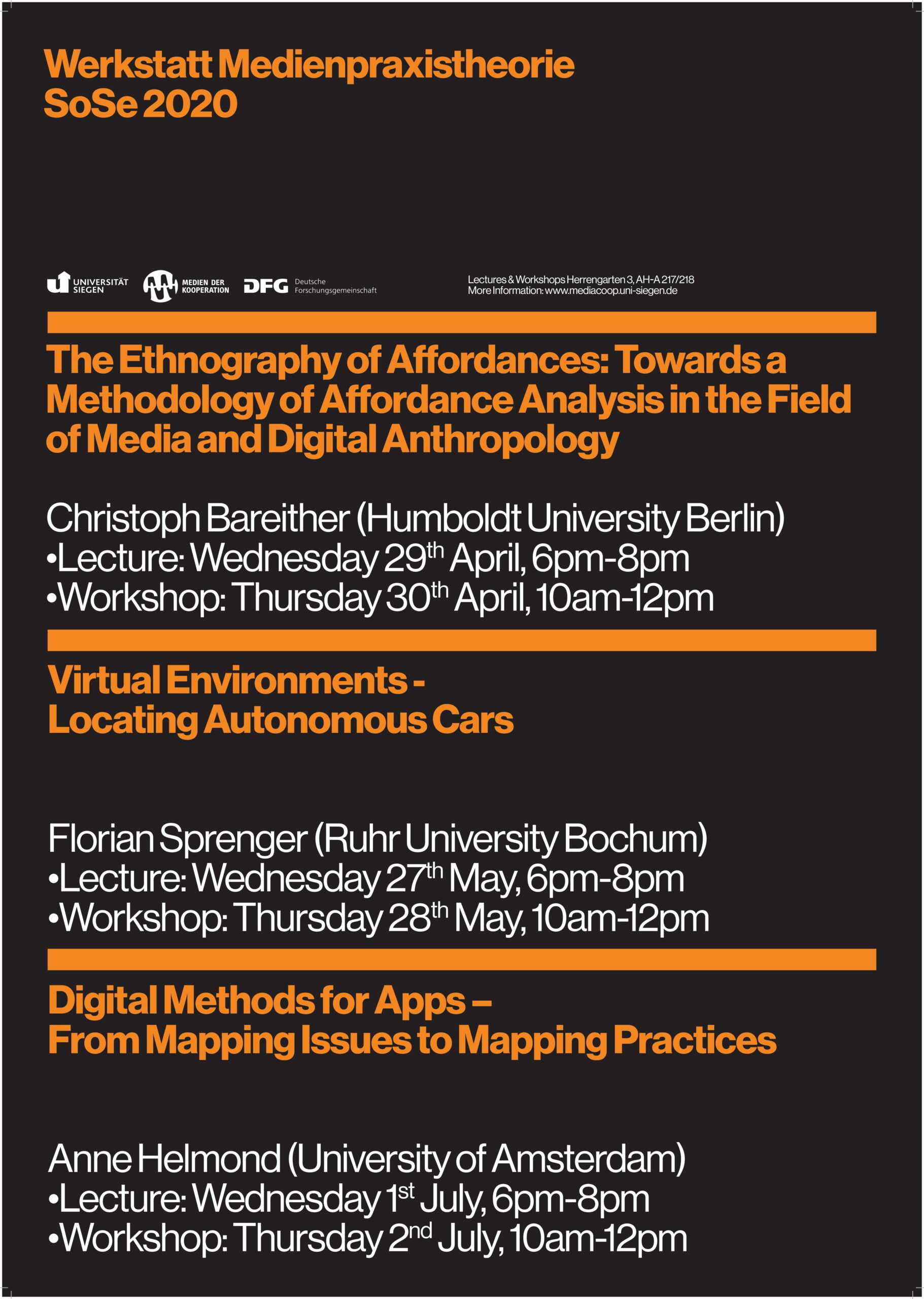
In recent years, approaches based on affordance theory have received significant attention in the field of media studies, especially in the transdisciplinary field of media and digital anthropology. Originally developed by James W. Gibson and then further conceptualized by various scholars (e.g. by Donald Norman, Tim Ingold, Stefan Beck, Ian Hutchby and Elisabetta Costa), the concept serves in numerous media anthropological studies today to describe relationally the potentials and restrictions of practice inscribed in technical and digital media. What is striking, however, is that despite the popularity of the affordance concept and a whole series of current theoretical introductory texts in various disciplines, there is a significant lack of attempts to develop a methodology of affordance analysis.
Building on my own ethnographic research with the concept of affordance, I would like to show several concrete ways in which affordances can be approached empirically. The starting point is a theoretical conceptualization of affordances, which does not understand them as static properties of technical objects, but always thinks of them in relation to media practices and, thus, also in relation to the incorporated knowledge – or, speaking with Bourdieu, the ‘practical sense’ – of the actors enacting them. Accordingly, the empirical approaches to affordances that I would like to propose are primarily ethnographically shaped. It is precisely in their relationality that the affordances of digital media can be made accessible through ethnographic interaction in both physical and digital spaces, for example through participant observation, qualitative interviews or through auto-ethnographic approaches. At the same time, ethnographic approaches to affordances greatly profit from media theoretical perspectives – this becomes all the more relevant the more complex the infrastructures and algorithms of digital media become. Implicitly, my talk thus also contributes to the discussion on the interweaving of media studies and ethnographic methods.
Christoph Bareither is Junior Professor of European Ethnology & Media Anthropology at the Institute for European Ethnology at the Humboldt-Universität zu Berlin. His research is concerned with the transformations of everyday practices and experiences enabled through digital technologies. He is especially interested in the fields of media and digital anthropology, museum and heritage studies, popular culture and game studies, digital methods and ethnographic data analysis, as well as the ethnography of emotions. As project leader and researcher at the Centre for Anthropological Research on Museums and Heritage (CARMAH), he applies the approaches of media and digital anthropology to foster our understanding of digital transformations in the field of museums and heritage. He runs the DFG-funded project Curating Digital Images: Ethnographic Perspectives on the Affordances of Digital Images in Heritage and Museum Contexts (with Sharon Macdonald and Elke Greifeneder) as well as the upcoming transnational research project Challenging
Using the example of autonomous vehicles, I would like to show that their autonomous behavior cannot be explained by the algorithmic transformation of inputs into outputs, but requires a concept that focuses on their temporality and mediality in order to explain their adaptability to an unpredictable environment. By virtualizing their surroundings, they localize themselves. Therefore, it is necessary to analyze more precisely how these environments are produced by technical methods of combining sensor data and filter algorithms. These methods produce the possibilities of alternatives, which underlie micro-decisions—in opposition to algorithms that are invariably determined.
Cancelled.
Vorträge im Sommersemester 2019
Die Werkstatt Praxistheorie widmet sich in diesem Semester den Medienpraktiken des Registrierens und Identifizierens.
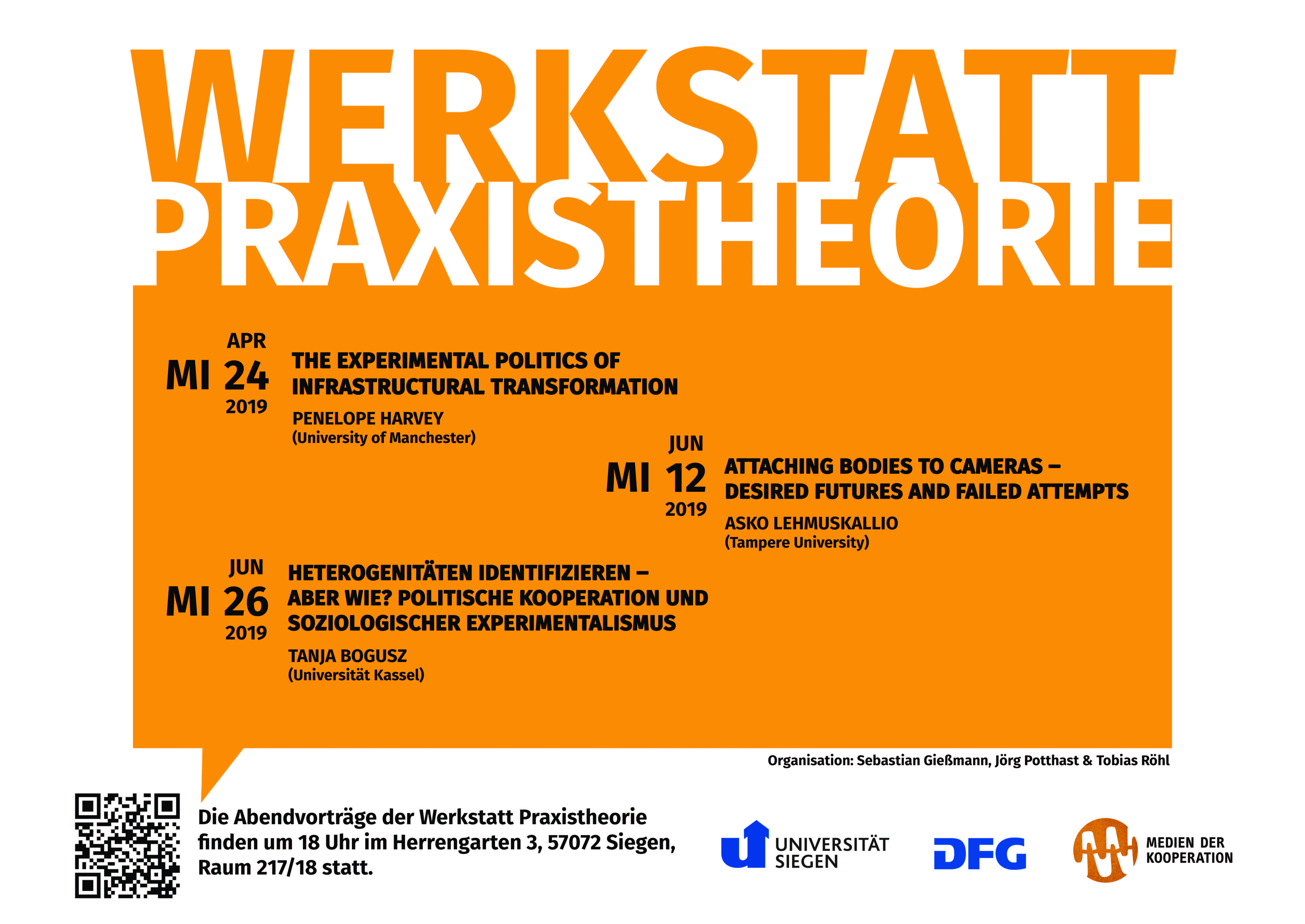
The paper argues that an ethos of experimentation is of central importance to contemporary neoliberal state politics – characterised by administrative decentralization, economic liberalization, infrastructural investment, and managerial government. Focusing primarily on the indeterminate and emergent forms of political life that take hold around processes of state decentralization in post-war Peru, the paper examines the complex politics of scale that mark relationships between diverse instances of the state. These emerge with particular clarity in infrastructure projects where attempts to reconfigure specific material and social relations confront conflicting competencies of national, regional and local agencies. A proliferation of technical instruments and norms are brought to bear in an attempt to contain the disruptive effects of such multiplicity. However, in practice, the diverse origins and orientations of these instruments and norms, foster ambiguity and uncertainty. State functionaries and citizens alike skilfully mobilize the multiple possibilities that the ambiguous regulatory frameworks offer them. But such attempts also reveal the precarious quality of the political, the arbitrary enactments of power and the techniques of differentiation that the ethos of experimentation also enables.
Since the early days of photography, it was hailed for the novel vistas that it provided. For being able to see with the help of photography, both the moment of capture, as well as the development of the captured image, had to be carefully orchestrated. Various ways for doing so were developed, and how-to-guides were distributed and published. A particular interest evolved in exploring the interrelations between bodies and photographic technology, since camera technology was considered to be useful for detecting and identifying both individuals and collective types. In order to do so, initial preparation and subsequent forms of analysis were of particular interest, and the various forms developed may be considered particular suggestions for attachment. This interest continues today, as camera technologies are deployed ‘in the wild’ for purposes of detection, registration and identification, often coupled to partially automated systems. This paper discusses exemplary couplings between bodies and camera technologies, and points towards a remaining tension in their use: a suspicion towards both bodies and technologies.
In der Soziologie ist die Praxis des Identifizierens und Klassifizierens Gegenstand der Untersuchung sozialer Disparitäten (Bourdieu 1999), sowie Grundlage für die Analyse von Entscheidungsprozessen (Luhmann 1990), die Untersuchung kritischer Akteurskompetenzen (Boltanski & Thévenot 2007) und Bewertungspraktiken (Lamont 2012, Kropf und Laser 2019). Zugleich aber trägt sozialwissenschaftliche Forschung zur Herstellung politischer Realitäten, bis hin zur politischen Staatenbildung bei (Desrosières 1993, Bowker & Star 1999, Law & Urry 2004, Didier 2009). Folglich legt von der mir entwickelte soziologische Experimentalismus im Anschluss an Dewey (Dewey 1996, 2008) nahe, das Beobachtete methodologisch mit der eigenen Forschungspraxis zu verknüpfen: Wie soziale Akteure identifizieren und klassifizieren auch wir und tragen damit zur Herstellung von Sozialitäten bei (Bogusz 2019). Das trifft insbesondere auf Praktiken der Kooperation zu, die, medial gestützt und motiviert, ebenso in Gesellschaft stattfinden wie Teil sozialwissenschaftlicher Forschungspraxis sind. Diese trivial klingende Feststellung wird zu einer komplexen Herausforderung, sobald politische Kooperationen, wie von Richard Sennett gefordert (Sennett 2012), nicht mehr primär von relativ homogenen, sondern ausgehend von soziomateriell und kulturell heterogenen Akteuren gebraucht werden, um ebenso tradierte wie gegenwärtig fortschreitende politische Fragmentierungsprozesse umzulenken. Auf der Grundlage des Kapitels „Testdurchlauf III: Was heißt Kooperation? Experimentalismus als Beitrag zu einer kritischen Sozialökologie“ in meinem Buch „Experimentalismus und Soziologie“ (Bogusz 2018) will ich mit Ihnen und Euch über die Frage nachdenken, wie und mit welchen Mitteln Heterogenitäten so identifiziert werden können, dass politische Kooperationen möglich sind. Im Vortrag werde ich anhand von ausgewählten erfolgreichen heterogenen Kooperationen 1) die theoretischen Grundlagen des soziologischen Experimentalismus anreißen und 2) dessen methodologische Heuristik skizzieren. Im Workshop möchte ich dann – gerne auch anhand von eingebrachtem medienwissenschaftlichen Material – drei Fragen vertiefend diskutieren: 1. Wie lassen sich soziomateriell heterogene BeiträgerInnen zur Bearbeitung politischer Probleme identifizieren und welche trade-off-Effekte könnte eine solche Identifizierung für sozial- und medienwissenschaftliche Forschung haben? 2. Welche Vermittlungs- und Motivationskompetenzen kommen dabei Medien zu, wen und was schließen sie ein und aus und wie könnten sie soziokulturelle Heterogenitäten (infra-)strukturationsfähig machen, d.h. entsprechende politische Prozesse beobachtend begleiten, mit-koordinieren, gar delegieren? 3. Wie ließen sich aus diesen Erkenntnissen Parameter für eine sozial- und medienwissenschaftliche Aktualisierung kritischer Öffentlichkeiten entwickeln?
Zitierte Literatur
Bogusz, Tanja (2018): Experimentalismus und Soziologie. Von der Krisen- zur Erfahrungswissenschaft. Frankfurt am Main & New York: Campus.
Bogusz, Tanja (2017): „Zur Soziologie der Bewertung in Pragmatismus und Experimentalismus. Symmetrie, Objektkonstitution, Forschungspraxis“, in: Lessenich, Stephan (Hg.): Geschlossene Gesellschaften. Verhandlungsband des 38. Kongresses der DGS, 26.-30.9.2016 in Bamberg. Frankfurt am Main & New York: Campus.
Boltanski, Luc und Laurent Thévenot (2007): Über die Rechtfertigung. Soziologie der kritischen Urteilskraft. Hamburg: Hamburger Edition.
Bourdieu, Pierre (1974): „Strukturalismus und soziologische Wissenschaftstheorie“, in Ders.: Zur Soziologie der symbolischen Formen. Frankfurt am Main: Suhrkamp, S. 7-41.
Bourdieu, Pierre (1999): Die feinen Unterschiede. Kritik der gesellschaftlichen Urteilskraft. Frankfurt am Main: Suhrkamp.
Bowker, Geoffrey und Susan Leigh Star (1999). Sorting Things Out. Classification and It’s Consequences. Cambridge, Massachusetts und London: MIT Press.
Dewey, John (1996): Die Öffentlichkeit und ihre Probleme. Bodenheim: Philo.
Dewey, John (2008): Logik. Die Theorie der Forschung. Frankfurt am Main: Suhrkamp.
Kropf, Jonathan und Stefan Laser (Hg.) (2019): Digitale Bewertungspraktiken. Für eine Bewertungssoziologie des Digitalen. Wiesbaden: Springer VS.
Lamont, Michèle (2012): „Toward a Comparative Sociology of Valuation and Evaluation”, in Annual Review of Sociology, 38. Jg., S. 201-221.
Law, John und John Urry (2004): „Enacting the social“, in: Economy and Society, 33. Jg., Heft 3, S. 390-410.
Sennett, Richard (2012): Together. The Rituals, Pleasures, and Politics of Cooperation. London: Penguin.
Vorträge im Wintersemester 2018/19
Die Werkstatt Praxistheorie widmet sich in diesem Semester den Medienpraktiken des Registrierens und Identifizierens.
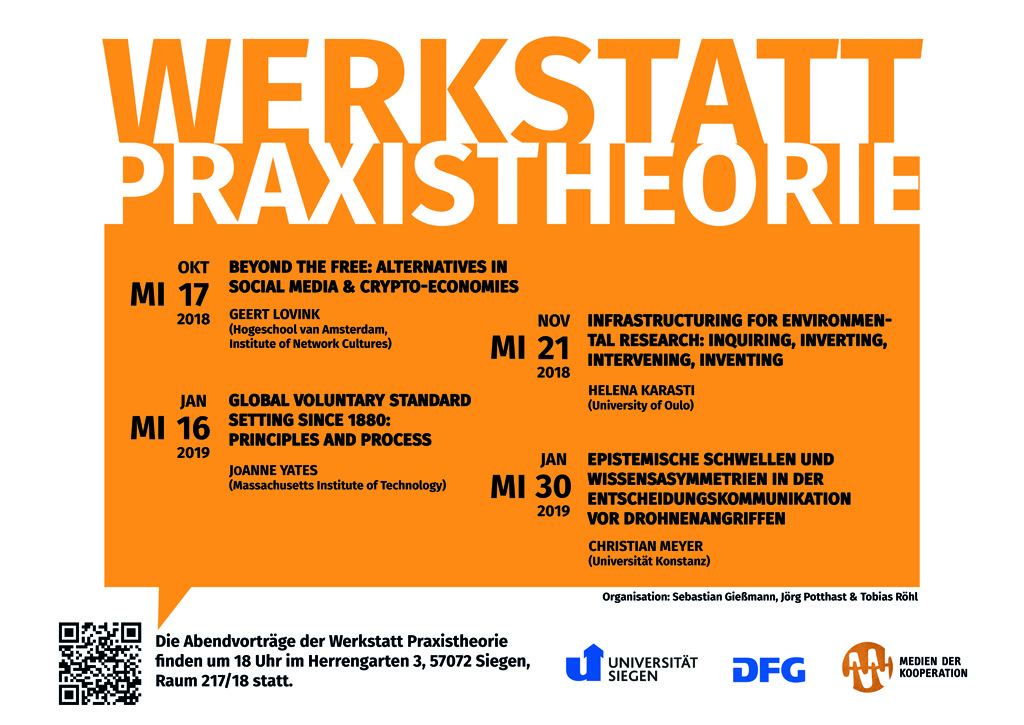

In this presentation I will give an overview of the recent work of the Institute of Network Cultures. How do we relate a radical critique of social media (our Unlike Us initiative) with efforts to design alternative internet revenue models (which we deal with in the MoneyLab network)? How can we get rid of the social contract of the ‘free’ and the related extraction model that Silicon Valley has imposed on us? How can artists and creative workers make a living in the 21st century now that copyright is dead and the decentralized value exchanges via blockchains are not yet in place? How can crowdfunding experiments, debates about ‘cashless society’ and universal basic income be linked? Can ‘federated’ networks become a viable alternative to the current centralized platform logic?
This lecture is based on my longitudinal research engagement with the Long Term Ecological Research (LTER) networks. I will reflect back on how I have constructed the ethnographic field and object of inquiry since 2002 and across multiple organizational, institutional and geographic boundaries. With my combined interest in ethnographic inquiry into participants everyday practices and participatory design approach for intervening, I recount how data and infrastructure came to matter in various ways, for example as information management, growing one’s own infrastructure and research infrastructure formation. From this background, I speak to ‘tight integrations’ of ethnography and participatory/collaboratory design and to extending the traditionally short-term and small-scale scopes of Participatory Design and Computer Supported Collaborative Work by ethnographically pursuing the sociotechnical phenomenon in question. Building on the work by Susan Leigh Star, Geoffrey C. Bowker and colleagues, I propose to study infrastructuring as it emerges through the dimensions of relational, invisible, connected, emerging and accreting practices, and through intervention and intentionality. I will end with some observations and experiences from our most recent investigation on the formation of pan-European research infrastructures for environmental research.
Private, voluntary standards shape almost everything we use, and have been critical to every major change in the world economy for more than a century, including the rise of global manufacturing and the ubiquity of the Internet. A social movement of engineers created this increasingly complex, worldwide system through three waves of institutional innovation beginning in the 1880s. The engineers initially aimed to prove their status as professionals by doing something that governments rarely wanted to do and markets typically failed to do — create useful standards. They created principles of balanced participation by multiple stakeholders and developed a process to reach consensus on standards that would be widely adopted by manufacturers and would satisfy the manufacturer’s corporate customers. By the 1920s, the standardizers thought of themselves as critical to national prosperity and world peace. After World War II, a second, increasingly international wave of the standardization movement transcended wartime enmities and Cold War divisions to create standards that made the global economy possible. Since 1990, a new generation of standardizers has launched a third wave, focusing on standardizing the Internet and Web and applying the same standard setting process to private regulation of the environmental and social downsides of globalization.
Wenn Bodentruppen bei Gefahr Drohnen zur Luftunterstützung anfordern, stehen deren Piloten vor der Herausforderung, die Völkerrechtskonformität des eigenen Angriffs sicherzustellen. Dazu müssen sowohl feindliche Kämpfer („military aged males“) als auch Waffen und feindliche Aktivitäten identifiziert werden. An der hierzu erfolgenden epistemischen Kommunikation sind mehrere Stellen beteiligt, die über den ganzen Globus verteilt sind, verschiedene Wissensstände aufweisen und unterschiedlichen Zugang zu Medien besitzen, die Informationen – etwa durch Kameraaufnahmen aus der Luft – verfügbar machen. Im Vortrag werde ich demonstrieren, wie die erforderlichen Wissensobjekte auf der Basis der medialen Information in verteilter Kognition identifiziert und ratifiziert werden und welche Rolle die sequenzielle Interaktionsdynamik bei der Entscheidung für oder gegen einen Luftschlag spielt.
Vorträge im Sommersemester 2018
Die Werkstatt Praxistheorie widmet sich in diesem Semester den Medienpraktiken des Delegierens und Experimentierens.
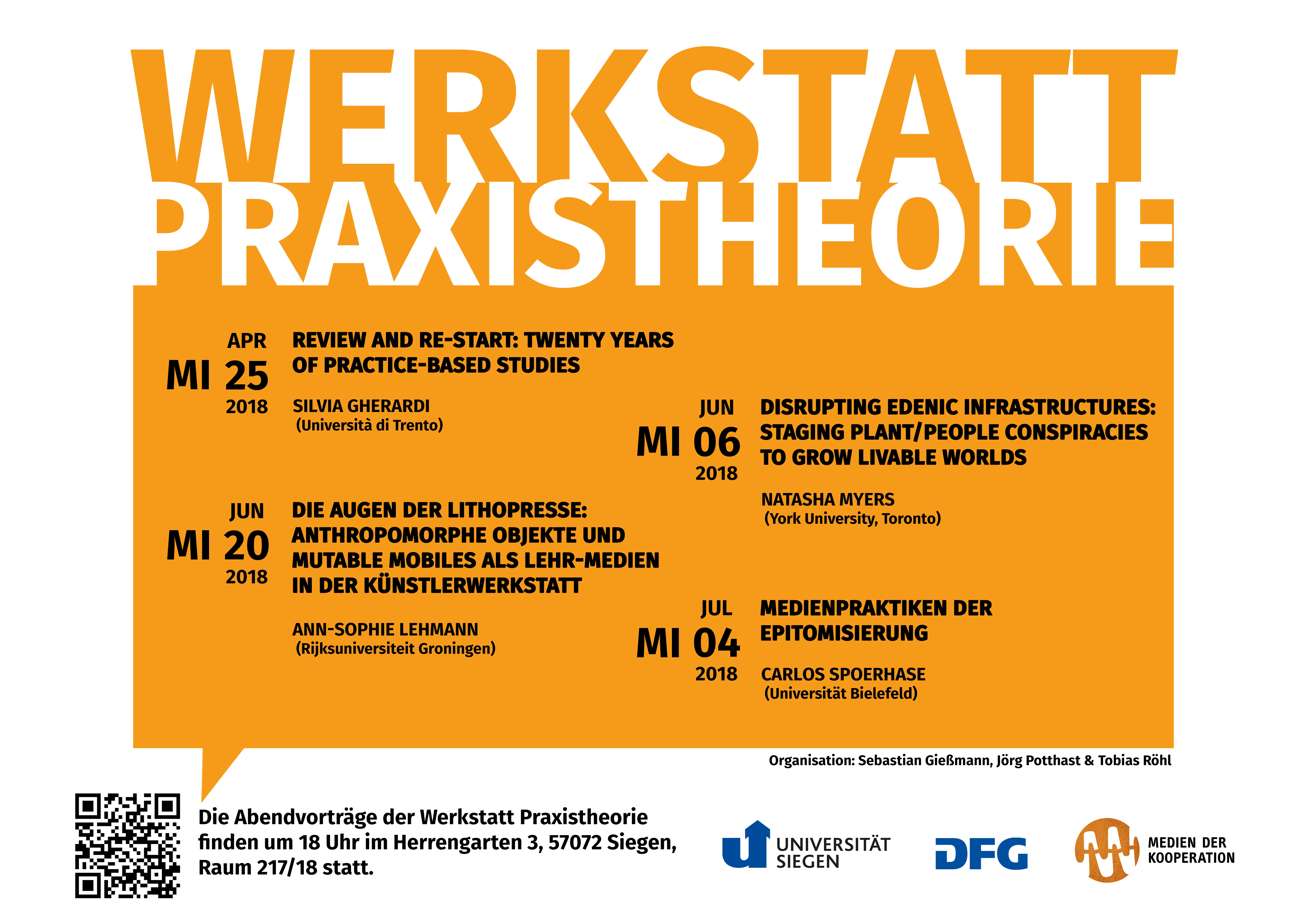
Around the 2000s there has been a ‘re-turn’ to practice theory, and the number of special issues of main journals in different disciplines testify its promise of a deep renovation in social sciences, after what has been called the ‘practice turn’ or the turn to practice. After twenty years we can track the effects of such a promise, keeping in mind that there is no such thing as a unified ‘practice theory’, only a body of highly diverse writings by thinkers who adopt a loosely defined ‘practice approach’.
The lecture and workshop propose to explore ‘practice-based studies’ as an umbrella concept and to retrace the way in which, over the years, I have developed a post-humanistic approach to social practice on the basis of an Actor-Network sensibility and the way in which the concept of practice appeared in the literature on learning and knowing in organizations. From this background, I illustrate an epistemology of practice grounded on relationality, multiplicity, and transformation, and I approach practice as an empirical phenomenon from the perspective of knowing as an activity situated in working and organizing practices. From this point of view the central interest in practice theories is how to bring forward a methodological framework to investigate the social, material, discursive, bodily, affective, aesthetic and ethical dimensions of practices.
Literature: Practices and knowledges (2018 forthcoming) Gherardi S, Rodeschini G. (2016), Caring as a collective knowledgeable doing: about concern and being concerned, Management Learning, 47(3): 266-284. Corradi, G., Gherardi, S., Verzelloni, L. (2010) Through the Practice Lens: Where Is the Bandwagon of Practice-Based Studies Heading? Management Learning, 41(3): 265-283.
In response to ongoing ecological catastrophes, artists, landscape architects, and conservationists are designing gardens with the hopes of restaging people’s relationships with plants. This talk juxtaposes the aesthetics and politics of divergent garden infrastructures. One response to the widespread acknowledgement of human impact on the planet is Gardens By the Bay, Singapore’s gleaming, billion-dollar infrastructure for what could best be called “end-of-times” botanical tourism. Another response is a series of works produced by Viennese artist Lois Weinberger. His “counter gardens” – plant-based durational installations and performances – challenge the moral order of Edenic gardens by inciting the subversive forces of weedy plants, and by celebrating waste, decomposition, and decay. Weinberger’s artworks, which invert and disrupt assumptions about the function of garden enclosures enact what Rancière might call a “redistribution of the sensible.” In so doing they offer a mode of critique for grappling with Singapore’s spectacle, showing how those gardens reproduce the very logics, discourses and practices that gave rise to the devastation they purport to denounce.
Die Vermittlung von technischen und künstlerischen Verfahren und den ihnen innewohnendem Material- und Praxiswissen ist bekanntlich schwierig. Statische Bilder und Texte können darin immer nur eine ergänzende Funktion haben, da sie die Gleichzeitigkeit der Interaktion von Hand, Material, Werkzeug und herzustellendem Objekt nur unzureichend beschreiben, während Film zwar jene Komplexität erfassen kann, aber Herstellungsprozesse häufig idealisiert, ästhetisiert oder ‘depräsentiert’, in dem das, was langweilig, wiederholend oder fehlerhaft ist, nicht oder ausschließlich gezeigt wird.
Die Beobachtung von Kultur ist auch in der Gegenwart auf Medienpraktiken der Epitomisierung angewiesen. Der Vortrag wird sich darum bemühen, diese Medienpraktiken anhand von aktuellen Beispielen vorzustellen und in eine übergreifende Theorie der Epitomisierung zu intergrieren.
Vorträge im Wintersemester 2017/18
Die Werkstatt Praxistheorie widmet sich in diesem Semester den Medienpraktiken der Delegation.
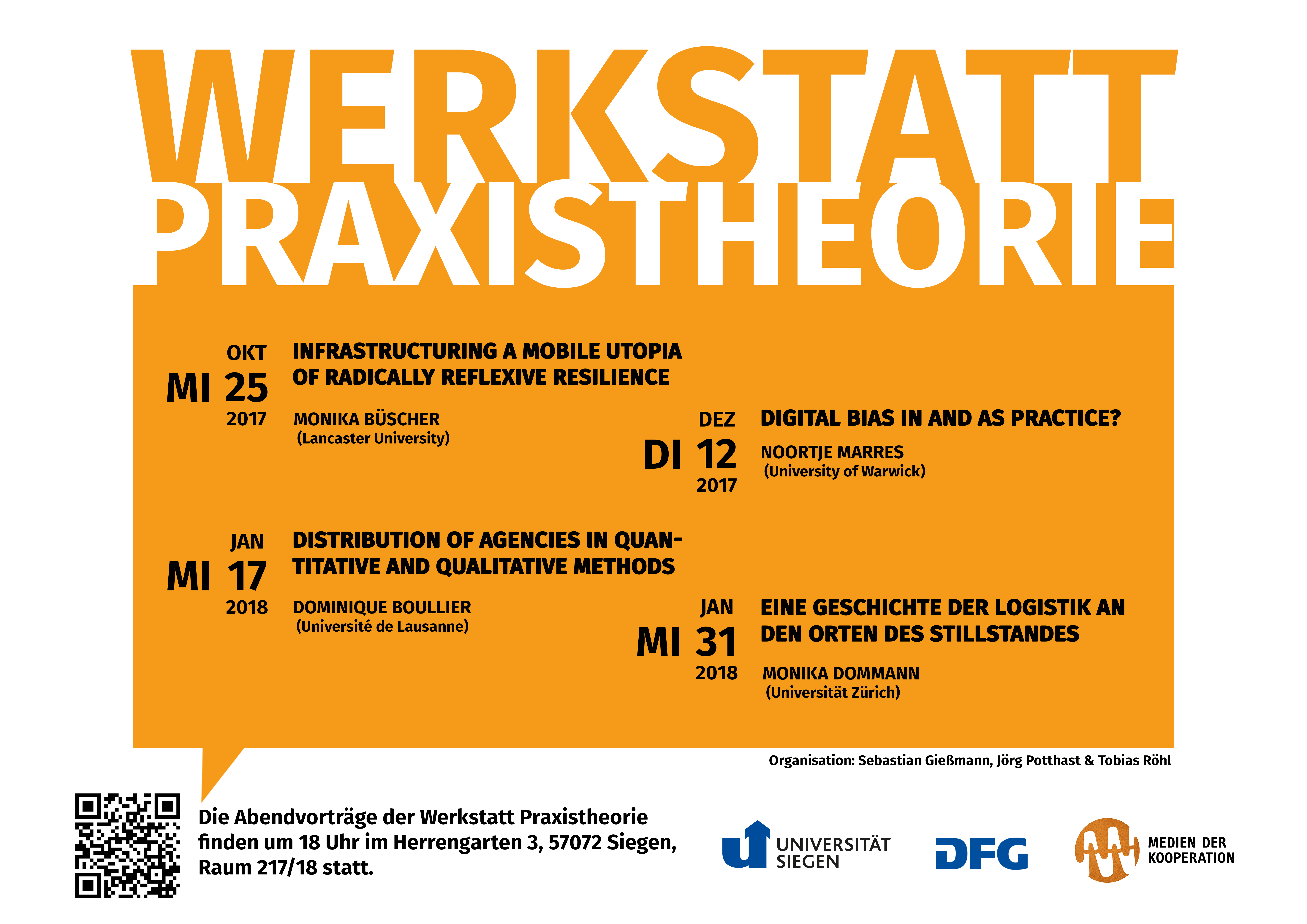
Since the 1992 Earth Summit, more than 4.4 billion people or 64% of the world’s population have been affected by disasters, and the number of ‘loss events’ has more than doubled (UNISDR 2012, Munich RE 2017). Resilience concepts respond to these pressures. However, the meanings, policies, and practices of resilience are ambiguous, enacting neoliberal devolution of risks and individualisation of responsibility, as well as new forms of relational resilience with ambitions for ‘respectful reciprocity, self-governance, improvisation and mutual aid’ (Crawford et al 2013:6). Digital technologies and novel platforms for ‘crisis mapping’ are a perspicuous site for an investigation of how such ideas of resilience are pursued, contested, and practically accomplished across sometimes globally distributed networks of actors. A particularly interesting aspect of this work are practices of ‘infrastructuring’ ‘mobile utopia’ of radically reflexive resilience. In this paper, I explore how almost all variations of resilience have a utopian dimension in that they envisage a way to ‘build back better’ or respond to risks preventatively, and how they require the mobilisation of ideas, people, and resources. I ‘mobilise’ utopia as a method for speculative sociology, following Levitas (2013) to critically unearth dynamics of mediating disasters and responses to them, to reflect on what it means to be resiliently human, and to describe the making of resilient socio-technical futures for, by and with diverse collectives. I explore what it might mean to ‘get relational’ and how forms of ‘reflexive doubt’ (Beck 1997, Cash 2016) and radical reflexivity (Pollner 1991) might support ‘good’ resilience.
Online data and software tools have been widely taken up to research social life, but their objectivity continues to be questioned in the social sciences and humanities: the data sets are incomplete, the tools don’t let us answer the important questions. Arguably, however, problems of ‚digital bias’ are changing face. Classic work on bias as a sociological phenomenon – Becker on lablleing; Hacking on interactive kinds – are becoming newly relevant, as digital platforms get caught up in interactive societal processes, whereby discriminatory content gets promoted online, and ’smart‘ services privilege some demographics over others. This paper will examine how sociological concerns with bias pertain to today’s digital societies, and ask: What is the contribution of praxiography to the elucidation of digital bias? In what ways do phenomena of digital bias pose a productive challenge for praxiology?
The history of quantification demonstrates how new calculation systems are associated to new conceptual frameworks in statistics and in the entities discovered (from society to opinion and now to replications). However, beyond these empirical observations of sciences in the making, a systematic choice of viewpoints is always made that emphasizes a specific kind of distribution of agencies: structures, individuals‘ preferences or replications as circulating entities. This is true for data science studies of Twitter for instance and for qualitative methods as well. This allows us to better understand why social sciences have always been the stage for fighting paradigms, including the more recent challenges brought in by ANT. The investigation of the social world requires to maintain a specific analytical point of view where the „whole“ of the assemblage gets lost for the benefit of the emergence of each agency.
Abstract coming soon.
Vorträge im Sommersemester 2017
Die Werkstatt Praxistheorie widmet sich in diesem Semester den Medienpraktiken der Delegation.
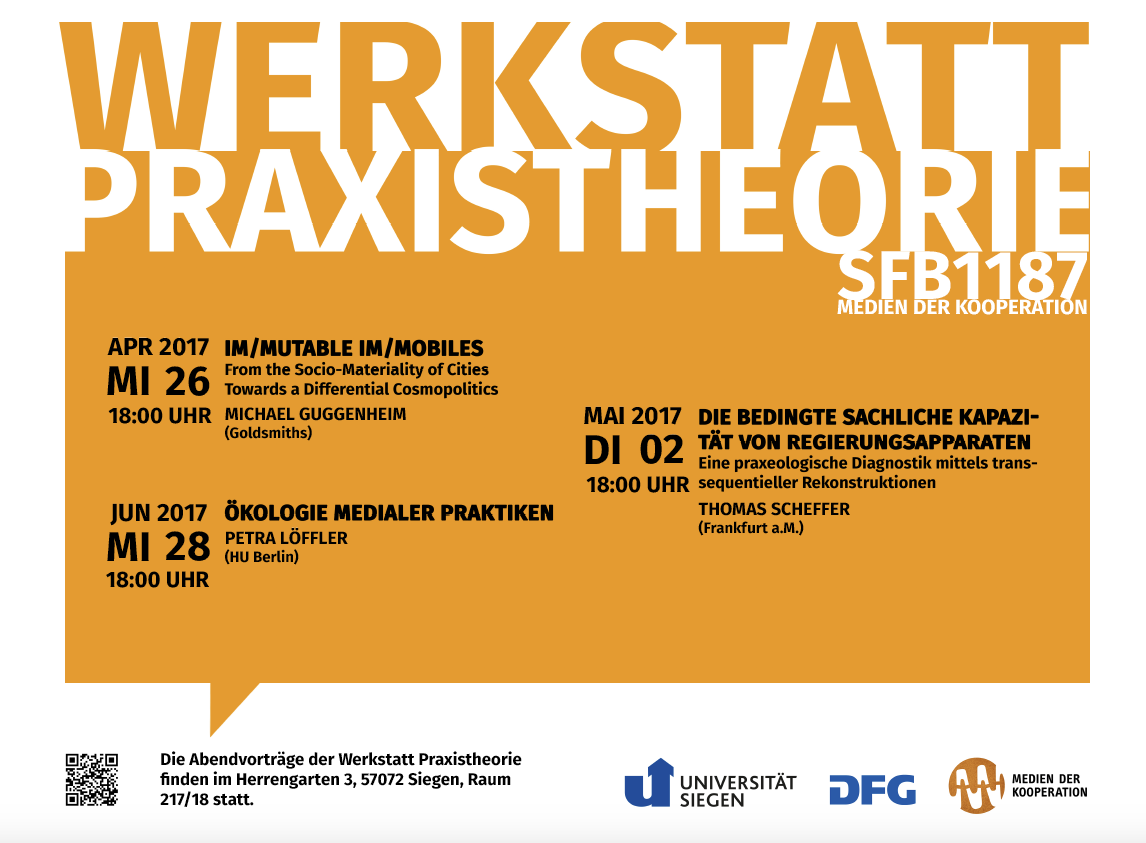
In this talk I aim to provide one possible answer to a simple question: How can we adequately theorize the built world we inhabit? How can we rethink the built world beyond the rural-urban distinction that lumps together places that are very unlike each other? My answer is to devise a differential cosmopolitics, a different way thinking about materialized practices that allows us to see changing morphologies of modern socio-materialities. The built world I suggest is patterned by different kinds of objects with different kinds of agency. Starting with the well-known idea of immutable mobile, I show that we can discern mutable mobiles (things, plasma), mutable immobiles (buildings) and immutable immobiles (infrastructures). I discuss two recent morphological shifts to the modern patterning of sociomaterial agency: assemblies without buildings and locational technologies that replace buildings.
In diesem Vortrag entwerfe ich ein trans-sequentielles Panorama, das entlang meiner bisherigen Ethnographien die Arbeit in Ämtern, Gerichten, Parlamenten oder Polizeistationen auf ihre sachlichen Kapazitäten hin vermisst. Dabei verknüpft die Objekt-zentrierte, trans-sequentielle Analyse Praxisforschung und Diskursanalyse und öffnet diese hin zur Gegenwartsdiagnose. Die Problembearbeitungskapazität der staatlichen Apparate erweist sich als jeweils bedingt – im Lichte existentieller Probleme.
Der Vortrag nimmt mit Matthew Fullers Media Ecologies und Isabelles Stengers’ Ökologie der Praktiken zwei Praxistheorien zum Ausgangspunkt, die aus unterschiedlichen disziplinären Perspektiven Überlegungen zu einer Ökologie medialer Praktiken entwickeln und deren Herausforderungen und Potenziale ausloten. Stengers’ Votum für eine Ethik des Experimentierens, die alle beteiligten Entitäten gleichwertig behandelt, trifft auf Fullers Verteidigung widerständiger kollaborativer Medienpraktiken. Davon ausgehend widmet sich der Vortrag den Verfahren und Aushandlungsprozessen experimenteller wie kollaborativer Praktiken und entwirft eine Medienpraxistheorie der Relationen.
Vorträge im Wintersemester 2016/17
Die Werkstatt Praxistheorie widmet sich in diesem Semester den Medienpraktiken der Koordination.
Written objects have been extensively studied in semiology, visual anthropology and sociology, and a large body of work focused on the interpretation of signs. In the case of directional signs, studies have stressed out the complexity of on-site adjustments to find one’s way and the inventiveness of riders. Such a user-centric perspective offers an asymmetrical account of the articulation between humans and signs. While users activities are rich and made up of ingenuity, the written object itself is pared-down, mostly considered as a stable and inert artefact. In other words, the agency lies exclusively in the eye of the beholder.
In this presentation, I suggest to step aside from the interpretation and uses of signs in order to surface the work that actually make them stand and last. Drawing on an ethnographic study of the Paris subway wayfinding system, I will insist that the mere presence and persistence of signs in a given space are the fragile result of a twofold continuous working process: design operations dedicated to the shaping of signs‘ properties and their environment; repair and maintenance practices oriented towards a daily consideration the fragility and vulnerability of signs. Shedding light on such a careful work is a way to contribute to the ongoing debates about information infrastructures by discussing three different aspects: graphical ecology, materiality, maintainability.
abweichend am Campus Unteres Schloss, Raum US-F 308
The division of knowledge that we have inherited is now in the process of imploding. The distinctions between (1) the natural and social sciences and (2) among the various social sciences is something that we inherited from the early 19th century. Yet, recent ‘socionatural’ changes have challenged that disciplinary architecture, itself enshrined in university departments and academic journals. Phenomena as diverse as climate change, information technologies and obesity have challenged the boundaries (if not the core) of these disciplines. I propose the creation of a new multidiscipline that reflects not the boundaries of the disciplines we have inherited, but the ways in which they all depend on the creation and maintenance of infrastructure. That infrastructure consists simultaneously of material objects – roads, bridges, buildings, server farms – and social arrangements ‘guaranteed’ by norms, standards and laws. All ‘disciplinary’ concerns are necessarily embedded in this infrastructure, are made possible by it and must be maintained and modified to take into account changes in the ‘socionatural’ world.
This speculative talk explores a series of questions arising from an interest in the relationship between infrastructures and complexes of social practice. In thinking about how infrastructures-and-practices change over time, how they interact in specific locations and circulate between them, and how forms of interdependence take hold I am interested in thinking about processes that are important in social theories of practice but not yet firmly on the agenda in science and technology studies. These include forms of ‘layering’, ‘obduracy’, ‘anchoring’, ‘de-tethering’ and ‘interweaving’ and ‘hybridisation’. I will make use of a collection of different examples – road infrastructures, digital networks, office buildings, power cuts and home IT – in support of an exercise in interdisciplinary agenda setting.
Systematisierte Kreativitäts- und Ideenfindungsmethoden wie morphologische Tabellen, Brainstorming oder Synektik erlebten in der Nachkriegszeit parallel zum Aufkommen der US-amerikanischen Kreativitätspyschologie und der Designmethodologie eine bemerkenswerte Konjunktur. Bezeichnend für diese Methoden ist, dass sie unterschiedliche Medien- und Innovationspraktiken aus der Wissenschaft, Industrie, Ökonomie und Gesellschaftspolitik miteinander verzahnen. Darüberhinaus lassen sich an ihnen auch soziotechnische Bemühungen nachzeichnen, die systematische Produktion von Ideen und Erfindungen in den Dienst nationaler militärischer und wirtschaftlicher Interessen zu stellen.